Banking & Financial Services
CVB Financial Corp. Announces Appointment of David A. Brager as new CEO
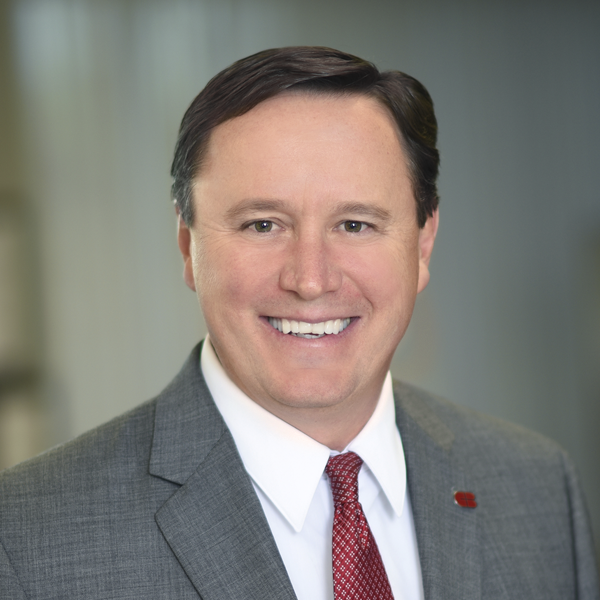
David A. Brager, Executive Vice President & Sales Division Manager, will succeed Christopher D. Myers
CVB Financial Corp. (NASDAQ:CVBF) and its principal subsidiary, Citizens Business Bank (together, “the Company”), announced that the Company’s Board of Directors has chosen David A. Brager to be the organization’s next Chief Executive Officer. Mr. Brager, who currently serves as Executive Vice President, Sales Division Manager, will assume the role on March 16, 2020 upon the scheduled retirement of the Company’s current President and CEO, Christopher D. Myers. Concurrently, Mr. Brager is being appointed to the respective Boards of Directors of CVBF and Citizens Business Bank.
CVBF’s Board of Directors led a thorough, nationwide search in partnership with Spencer Stuart, a leading executive search firm. The promotion of Mr. Brager affirms the quality of the Company’s senior management team and the Board’s confidence in the Company’s strategy and continued strong performance. In order to facilitate a smooth and orderly transition, Mr. Myers, who has served as the Company’s CEO since 2006, will remain available to the Company as a consultant through December 31, 2020.
“Our Board is very grateful for Chris Myers’ leadership the past 13 years and is truly delighted to have selected Dave Brager as CEO to lead our Company’s next chapter,” said Raymond V. O’Brien III, the Company’s Chairman of the Board. “Following Chris’ decision to retire, which was announced this past July, our Board engaged in a thoughtful evaluation process. While the Board was of course already impressed with Dave, it was important and helpful to have the opportunity to benchmark his candidacy against an extensive, nationwide field of contenders. We are quite pleased with the outcome.”
“I am truly honored that our Board has chosen me to lead this outstanding organization that has been named #1 on the Forbes’ America’s Best Banks list for two of the past four years — including 2020,” said David A. Brager, Executive Vice President, Sales Division Manager and the Board’s appointee to be the next CEO of the Company. “I see this as a terrific opportunity to leverage my deep understanding of our Bank’s growth strategies and local geographic markets to continue to deliver strong financial results. We have worked hard to build our industry-leading platform, and I am confident that our talented team will continue to expand and reach new heights for the sake of our customers, communities, shareholders and employees.”
Chris Myers, the Company’s retiring President and CEO, commented: “Dave and I have worked closely together for the past nine years. He has been deeply involved in executing our strategy, particularly on the sales side of the business. As such, he should be well prepared to continue ahead on our path of excellence. From a continuity standpoint, Dave is the right choice to lead this Company. He will be well supported by a seasoned and motivated senior leadership team. I wish Dave all the best in his new role and am confident that the incredible legacy of this Company is intact and ready to move forward.”
Mr. Brager has over 30 years of banking experience in a variety of senior leadership roles, including serving the past 17 years at Citizens Business Bank, where his present responsibilities encompass oversight of all the Bank’s business financial centers, customer lending and deposit relationships, marketing, treasury management, international services, government services and bankcard products. Dave joined CVBF in 2003 as a Vice President and was recruited to build and manage the Fresno Business Financial Center on a de novo basis. The office achieved early entrepreneurial success and, four years later, he was promoted to SVP and Regional Manager for the entire Central Valley area of California. Based on his continued strong record of achievement, at the beginning of 2011, Dave was promoted to EVP and Sales Division Manager, reporting directly to CEO Myers in Ontario, CA. Prior to his tenure with the Company, Mr. Brager worked for over seven years at Westamerica Bank. Mr. Brager received his B.S degree from California State University, Fresno. He is a graduate of the Pacific Coast Banking School in partnership with the University of Washington’s Graduate School of Business.
Corporate Overview
CVB Financial Corp. (“CVBF”) is the holding company for Citizens Business Bank. CVBF is one of the 10 largest bank holding companies headquartered in California with over $11 billion in total assets. Citizens Business Bank is consistently recognized as one of the top performing banks in the nation and offers a wide array of banking, lending and investing services through 58 banking centers and 3 trust office locations serving the Inland Empire, Los Angeles County, Orange County, San Diego County, Ventura County, Santa Barbara County, and the Central Valley area of California. Shares of CVB Financial Corp. common stock are listed on the NASDAQ under the ticker symbol “CVBF”. For investor information on CVB Financial Corp., visit our Citizens Business Bank website at www.cbbank.com and click on the “Investors” tab.
Banking & Financial Services
California’s Economic Horizon: Treasurer Ma’s Optimistic Forecast for the Inland Empire

State Treasurer Fiona Ma outlines key initiatives and predicts robust growth for the region, highlighting major projects and economic strategies
By Ken Alan, Freelance Writer for IEBJ
California State Treasurer Fiona Ma presented an optimistic economic forecast for the Inland Empire at the Mid-Year Banking & Financial Industry Outlook. “I spend a lot of my time traveling to all 58 counties to understand their economic development needs and match them with investors,” she explained.
Treasurer Ma highlighted her support for the Brightline West high-speed rail project, which secured $3 billion in funding from President Biden’s Bipartisan Infrastructure Bill and an additional $3.5 billion through private activity bonds (PABs). The 218-mile train, running through the median of Interstate 15, will have stations in Las Vegas, Victor Valley, Hesperia, and terminate in Rancho Cucamonga, where it will connect with the California High-Speed Rail.
While high-speed rail remains controversial due to its high construction costs, Ma argued that such systems are vital solutions to highway gridlock and the high cost of housing in major metro areas. With no significant highway projects in the planning stages, California legislators are considering electronic tolls to manage peak hour traffic. Additionally, the air travel industry continues to struggle with pilot shortages, high fuel costs, safety concerns, and customer service issues, which could be alleviated by increased competition. The persistent barriers to new housing—such as labor costs, high interest rates, and government red tape—also remain formidable.
The construction of the Brightline project is expected to take four years, aiming for completion in 2028 just in time for the Olympic Games in Los Angeles. Ma promised three years of high-paying construction jobs and mentioned plans for new affordable rental units and renovations to existing ones.
Treasurer Ma also referenced the Barstow International Gateway project (BIG) as another economic catalyst for the Inland Empire. Though not directly involved, she noted that the railroad company BNSF had purchased 4,000 acres on the west side of Barstow to develop a major transloading center for international freight from the ports of Los Angeles. This initiative is expected to significantly reduce truck traffic on Southern California freeways and boost San Bernardino County’s economy.
Treasurer Ma oversees a state budget of $3.7 trillion. During the first two years of the pandemic, California realized surpluses of $46 billion and $96 billion, respectively. However, in the third year, the state faced a $50 billion deficit due to layoffs in tech companies, declines in commercial leases, and reductions in individual and corporate tax revenue.
“Our state heavily relies on personal income tax, corporate tax, and sales taxes,” Ma added, noting that as of May, personal income taxes were up $1.4 billion over projections and corporate taxes had risen by $752 million.
Ma invited business leaders to explore the California State Treasurer’s website (www.treasurer.ca.gov) to learn more about state programs that support economic prosperity, including Cal Savers, the Scholarship 529, and CalABLE for disabled workers.
She is currently collaborating with a Blue Ribbon Commission to provide banking services to residents unable to afford traditional banking. Ma emphasized that California’s quality of life remains a competitive advantage over lower-tax states with laws she described as unfriendly to women, minorities, teachers, and doctors. She also noted the high interest from investors in the state.
The Mid-Year Outlook featured a panel discussion with industry leaders on the current and future states of finance. William Wang, MBA, a cash flow expert, encouraged business leaders to consider the opportunity costs against high interest rates, suggesting that a 5% rate change should not significantly impact businesses with a solid capital use strategy. Ursula Garrett, CPA, advised business owners to maintain accurate records to avoid audits and recommended consulting a CPA if contacted by the IRS. Krisante Gunewardena from RE/MAX Diamond Bar noted a recent reduction in lease rates, suggesting it’s an opportune time for office sector investments.
The event was hosted by the Inland Empire Regional Chamber of Commerce at Riverside City Hall’s Grier Pavilion on Thursday, June 6.
Banking & Financial Services
Rate Changes are Looming: Follow Long-Term Game Plan for Winning Capital Decisions
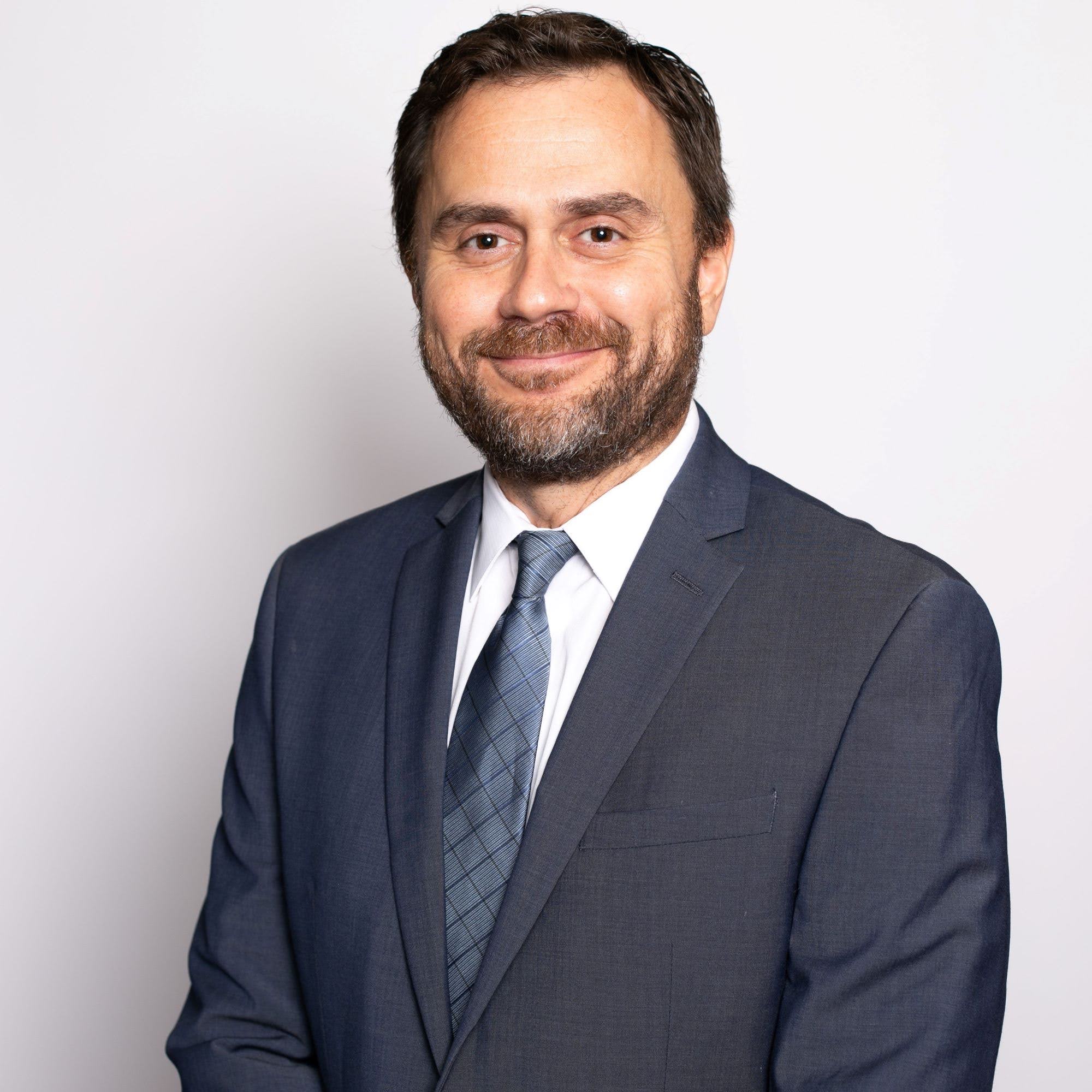
Four key strategies for borrowing during interest-rate uncertainty
By Greg Martinez-Miller
While basketball fans everywhere are following NBA schedules, business owners are tracking the 2024 Fed meeting schedule. But just as true hoops enthusiasts know that game strategy is comprised of more than three-point shots, so should business owners remember that interest rates aren’t the only factor for long-term success. Last December, the Fed said that it expected to cut rates, which are at a 22-year high, three times in 2024. Yet when the central bank met in March, it left rates unchanged, saying it didn’t want to jeopardize lower inflation and healthy economic growth.
So, when the Federal Open Market Committee meets again on April 30-May 1, anticipation will be high. Prognosticators are on every channel, wondering whether the central bank will keep its 5.25-5.5% target rate unchanged again, or if it will announce the first of its three cuts. And if it does, observers ask, how could lower rates impact growth in the U.S. economy?
As a commercial banker who has watched the interest rate scoreboard over the past 16 years, here’s my advice from the sidelines: Stick to your long-term game plan. Put your company in a position to win the balance-sheet game when it comes to the cost of capital.
Here are my four key strategies from my dogeared playbook to keep your head in the game:
1. See the court
Do not focus on interest rates alone for your capital strategy. You need to be aware of other negotiated factors when funding your company’s financial future. Besides interest rates, other terms — loan maturity, advance rates, and guarantees — can offer important value. Many times, it makes good strategic sense to pivot from the interest rate toward other terms to advance your company’s medium- and long-term game plan.
2. Do not overreact to the officials
The Fed is like an economic referee, making calls to control the economy’s pace. Do not lose your cool when the whistle blows. Three rate reductions are still expected this year, but when the central bank plans to make that call, no one knows – yet.
3. Manage the clock
Think about timing when it comes to borrowing. When rates dip, you might consider making a few key borrowing moves to fund some crucial projects and wait to fund other projects later in the game. Consider the purpose of the debt on your balance sheet. Would your company benefit from having a mix of floating and fixed rates? This may allow you to hedge and still potentially benefit from low floating rates, while also maintaining certainty for longer-term, fixed rates.
4. Stick with your game plan
When rates do change, do not throw out your playbook. Instead, call a time out and consult with your banker or interest rate risk advisor to help ensure your borrowing decisions match your company’s long-term plans and goals for continued growth and success.
If you do not need capital, do not borrow just to lock in a lower rate. Interest rates should not be the driving factor when making borrowing decisions. Borrow when you need to; have a good reason for it.
Remember, interest rate changes will always interrupt the flow of your game. But your goal is to ensure that your financial future is deliberate – not purely defensive, based on the ebb and flow of interest rates.
Greg Martinez-Miller is the commercial banking leader for Wells Fargo in Inland Empire. Based in Ontario, Martinez-Miller leads a team of commercial relationship managers in Riverside and San Bernardino Counties. The views expressed present the opinions of the author on prospective trends and related matters in middle market banking trends as of this date, and do not necessarily reflect the views of Wells Fargo & Co., its affiliates and subsidiaries.
Banking & Financial Services
2024 Inland Empire Financial Summit: A Milestone in Economic Empowerment
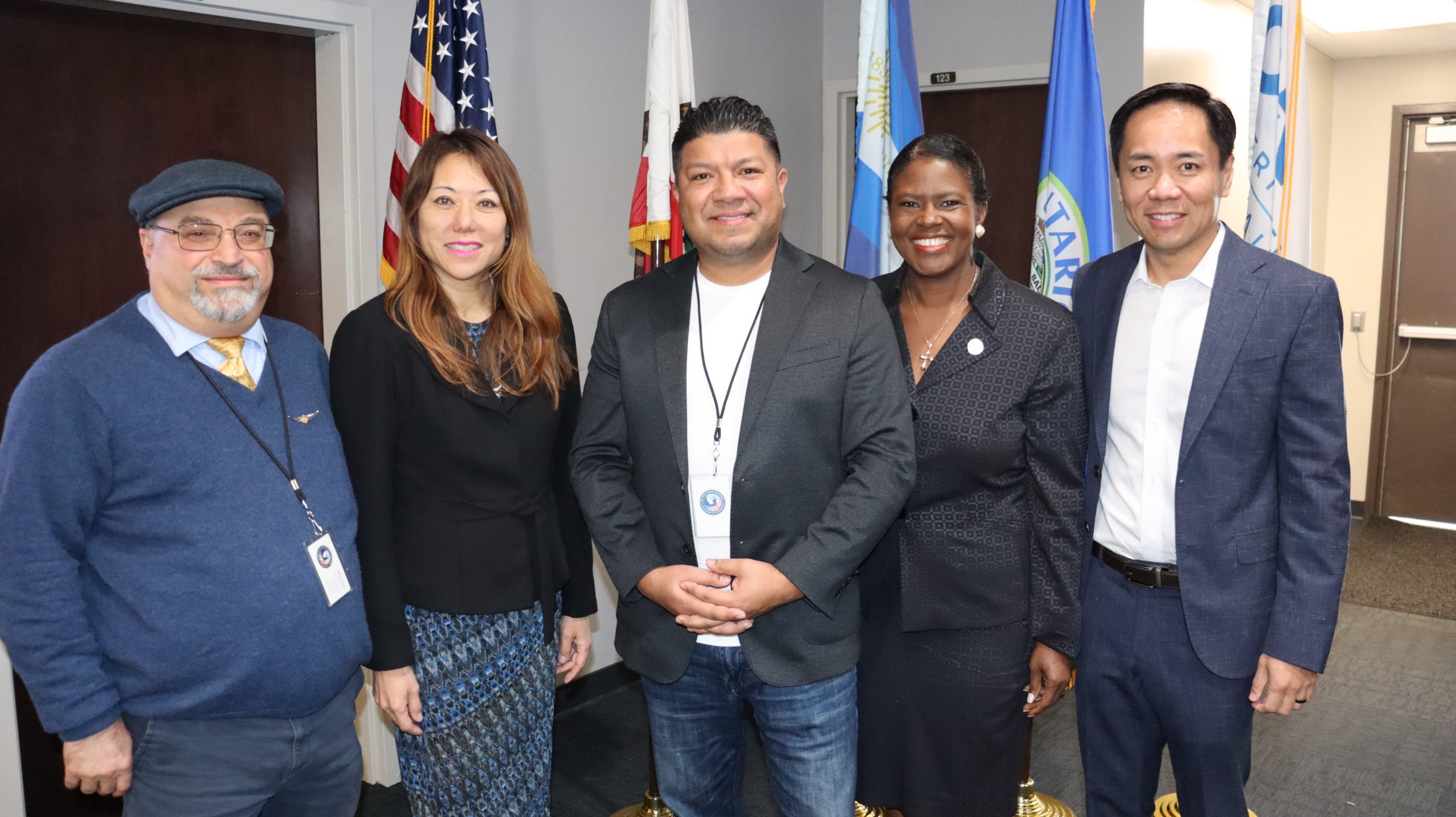
Uniting Leaders and Innovators for a Thriving Economic Future in Southern California’s Inland Region
The Inland Empire Regional Chamber of Commerce proudly announces the resounding success of the 2024 Financial Industry Update, a landmark event that convened key figures in California’s financial sector. Held on January 18, 2024, at the Ontario International Airport Authority Conference Center, this summit marked a significant moment for economic empowerment and collaboration in the region.
California State Treasurer Fiona Ma, the keynote speaker, expressed her admiration for the region’s financial community: “As State Treasurer, I find constant inspiration in California’s vibrant financial community. The 2024 Financial Industry Update event highlighted not only the dynamic Inland Empire economic landscape but also emphasized the crucial role of collaboration and forward-thinking in our sector. The meaningful discussions and connections formed here reflect our collective dedication to fostering a resilient and prosperous financial future for California. Proud to contribute to this vital conversation, I eagerly anticipate witnessing the positive impacts of our shared efforts unfold statewide.”
Ivo A. Tjan, Chairman, President & CEO of CommerceWest Bank, shared his enthusiasm: “It was an honor to be invited as a guest speaker. The IE has a strong, diversified, and robust business community that is an important economic engine for California. CommerceWest Bank is excited to continue supporting local businesses in the IE and expanding our footprint.”
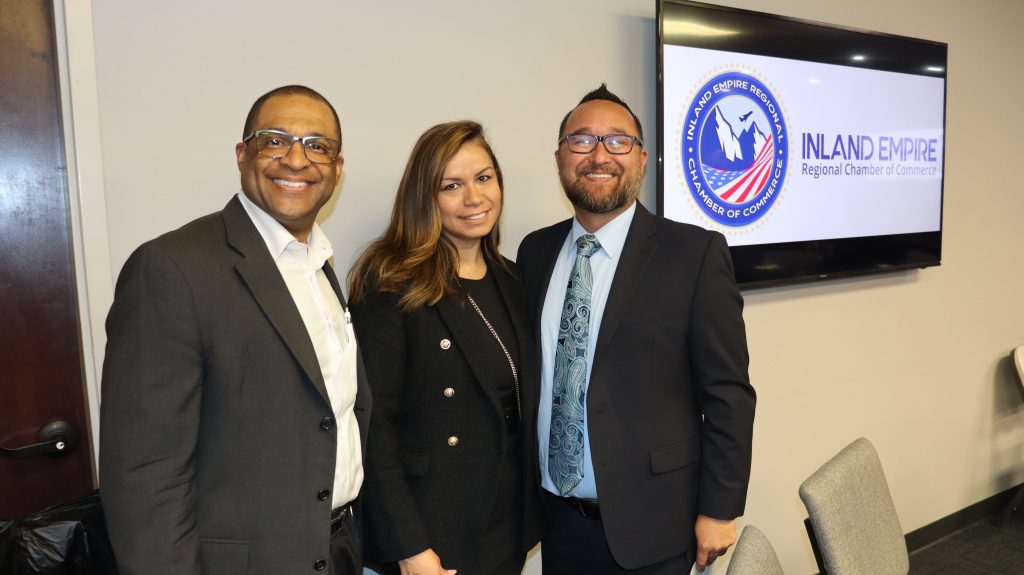
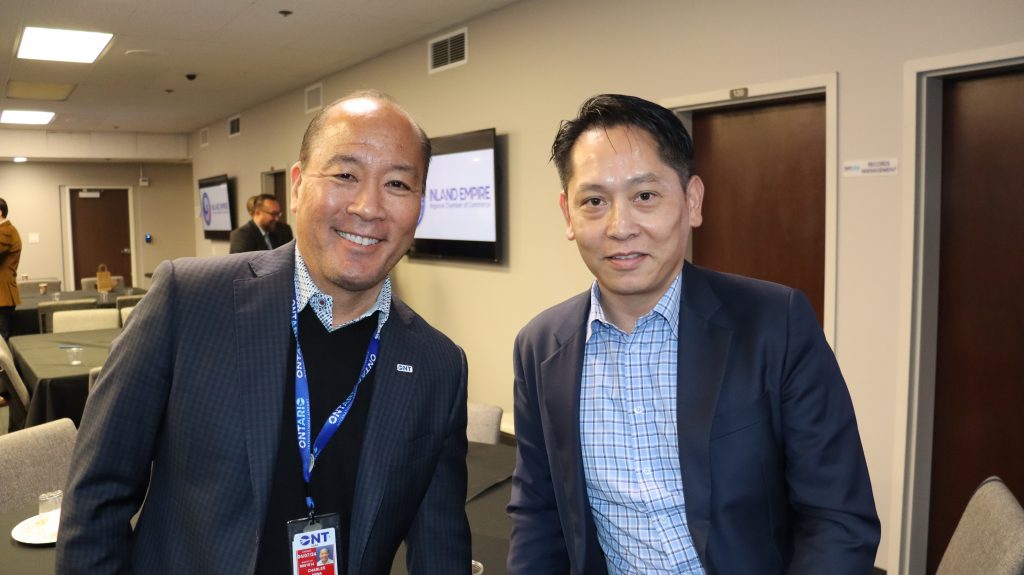
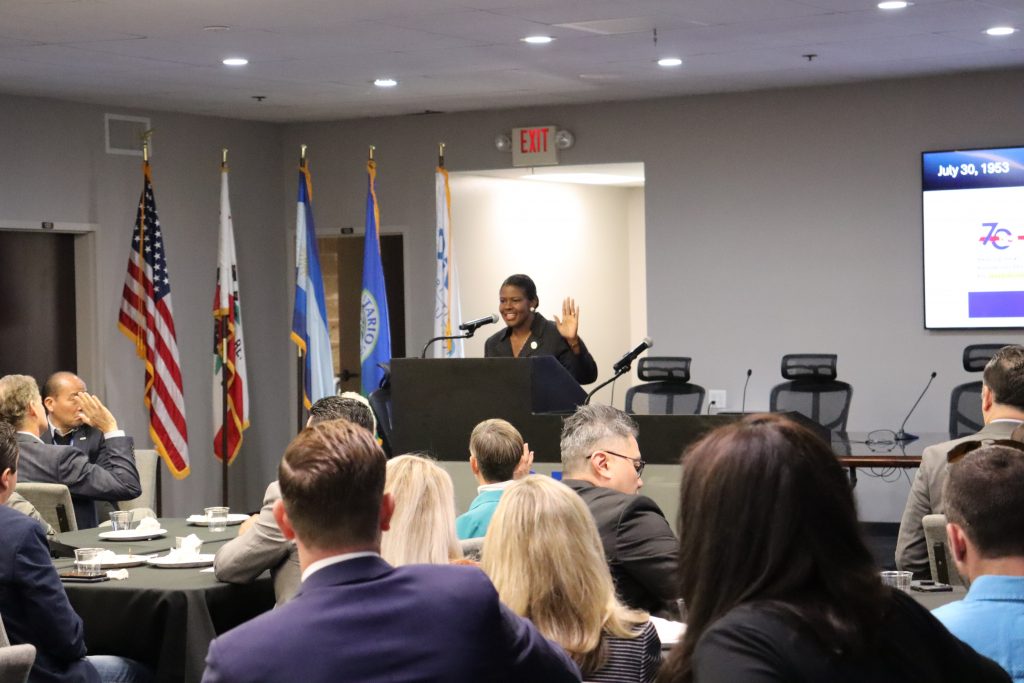
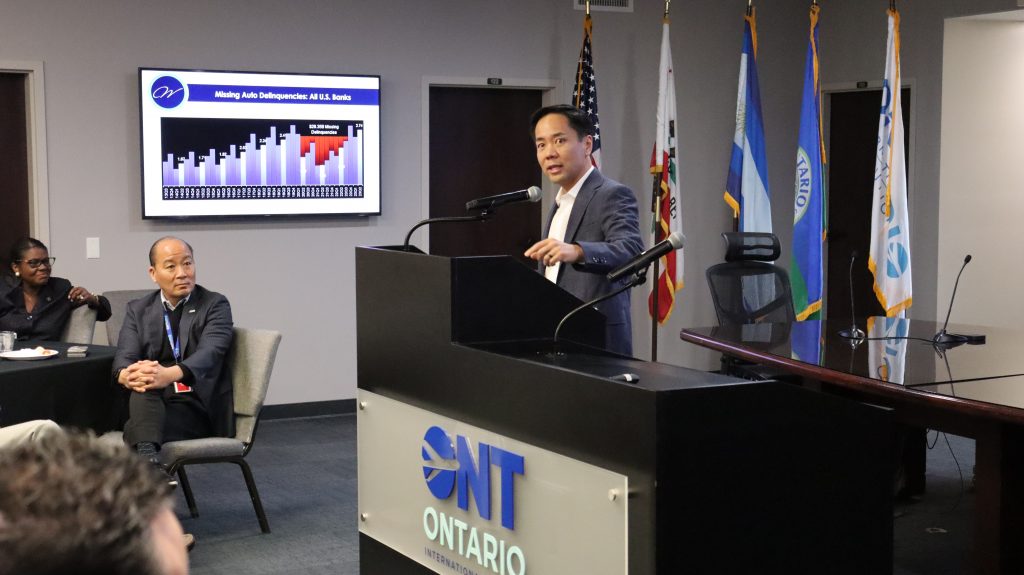
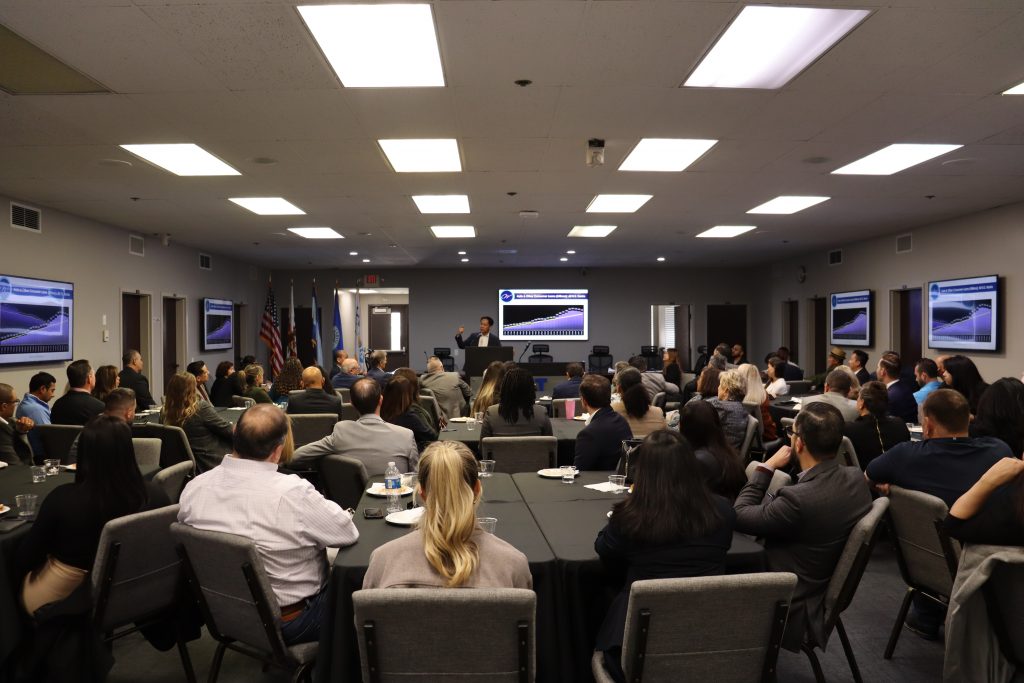
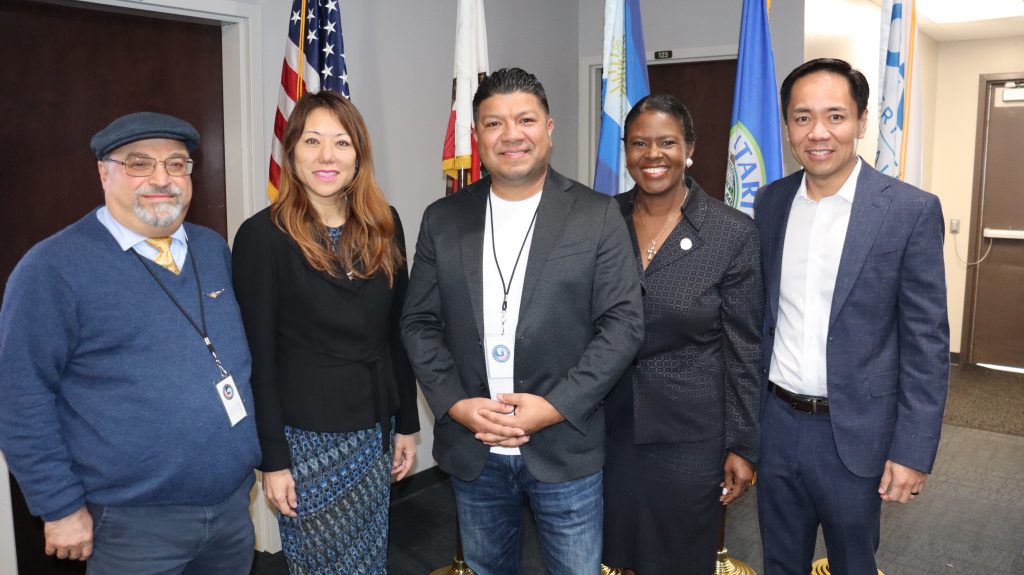
Hilda Kennedy, President & Founder of AmPac Business Capital, praised the event’s impact: “The Inland Empire Chamber did it again! They brought relevant, high-level content to help businesses plan for success in 2024. State Treasurer Fiona Ma and Ivo Tjan were exceptional! I agree with State Treasurer Ma, the Inland Empire region will save California.”
Christina Scranage, Business Development Manager at Keystone Advanced Solutions, reflected on the event’s value: “Grateful for the insightful conference today! The speakers provided valuable information, making me optimistic about our community’s economic outlook. Huge thanks to everyone involved for such an informative and helpful event!”
The event was highlighted by the participation of industry leaders who provided invaluable insights into the region’s economic landscape. The Financial Industry Update served as a crucial platform for networking, knowledge sharing, and exploring the challenges and opportunities facing the financial sector in the Inland Empire and beyond.
For more information about the event and the Inland Empire Regional Chamber of Commerce, visit www.iechamber.org.
-

 Opinion1 month ago
Opinion1 month agoSurge in Unemployment Among California Youth Linked to Minimum Wage Hikes
-

 Commercial Real Estate Transactions3 weeks ago
Commercial Real Estate Transactions3 weeks agoSRS Real Estate Partners Announces Record-Breaking $6.15 Million Ground Lease Sale of a New Construction Chick-fil-A Property in Murrieta, California
-

 Health & Wellness3 weeks ago
Health & Wellness3 weeks agoBuddha Bars: A Mother’s Innovative Solution to Healthy Snacking
-
By Press Release1 week ago
California Employment Expansion Continues But Still Trails Nation




